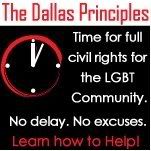buried in the 3rd page of the article, larry kramer speaks up and tells us what we need to hear: that we need to follow the strategy employed by Act Up that was so effective in the early days of the HIV/AIDS awareness fight.
from the article, emphasis added:
History offers an uncomfortable answer. At the start of the 1990s, when Bill Clinton had a vision for America and we were part of it, gay people were intoxicated with excitement and a sense of opportunity. By decade’s end, the president had signed DOMA and “don’t ask, don’t tell.” “The movement was not honest enough with itself about our own failures,” Guerriero says. “The president caved to Congress because we didn’t show up and provide the air cover he needed with smart, strategic, robust activism.”That’s because, on the federal level, “we don’t have an organization that fights for us with sufficient teeth in their arsenal,” says novelist, playwright, and gay rights pioneer Larry Kramer. “I’m sick of saying it, and everyone thinks I’m nothing but a curmudgeon. But I am approaching closer and closer to death, to my death, without being able to marry my lover, without being able to leave my estate to my lover without it being taxed into oblivion.”
Kramer’s tone isn’t curmudgeonly. It’s weary, almost shell-shocked. Gay activists in Washington are feckless, he argues, because they are enchanted by a false idea of power. “We are not here to make friends,” he says. “We are here to get our rights. And these two statements do not join together to blend into one happy halo.”
The national gay rights movement is trapped between activism and politics, between anger and ambition. We are trapped between wanting equal rights and wanting to get invited to parties at the White House. Even Joe Solmonese, the president of HRC, who according to Kramer represents the movement at its most complacent, suggests that to become real players we are going to have to start acting a little more like heroes: “One of the things our movement does not give enough appreciation and reverence to is ACT UP. Their rage. Their anger. But always with an endgame, always with a strategic center,” he says.
Kramer, who cofounded ACT UP in 1987 to address the AIDS crisis, says the group worked on very simple principles. “We all, hundreds of us, got ourselves in a room, and we planned very specific points of attack, and we divided the various plans into segments, each of which was taken over by one or another of our committees and put into operation. You go after the things that you want. Marriage, inheritance, adoption, ‘don’t ask, don’t tell,’ repeal of DOMA. And then you start doing public demonstrations about each of them. Passing out detailed literature explaining the action. Naming names of the people who are preventing progress on these actions. You are merciless in confronting [those people], day after day. Consistency is so important. You have to be an activist every day, seven days a week, until you reach your goal. It’s not rocket science, any of this. You want something that somebody won’t give you? You find out how to get it.”
The gay movement today, he contends, lacks leaders with the level of commitment that animated ACT UP -- people who are willing to employ the shaming techniques that ACT UP used, and people who are willing to identify as gay first and foremost.
Kramer’s right on both points. Yet the problem is intractable. Shy of another dozen equally well-publicized Matthew Shepards or a new plague, it’s hard to see how a critical mass of gay people might be moved to experience themselves as “gay first and foremost,” how we might be moved to choose the radically separatist identity that has been, in our own history, our best weapon. Is it possible that the enemy has changed? If so, is it possible that different techniques are called for?
“I do not see a different enemy,” Kramer says. “The enemy is the enemy. We are hated too much by too many. And we are afraid to acknowledge this and to look it in its face for what it really is, hate, and to stare it down and fight it back. And become, as we did in ACT UP, our own heroes."







No comments:
Post a Comment